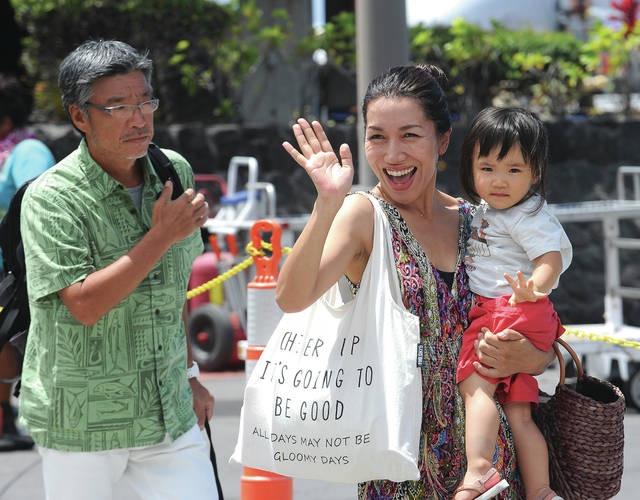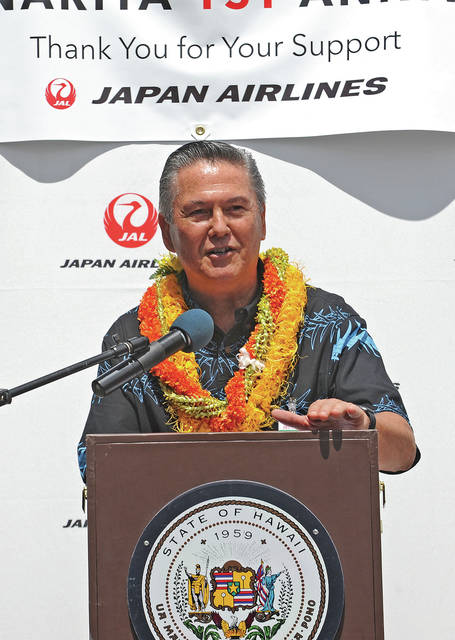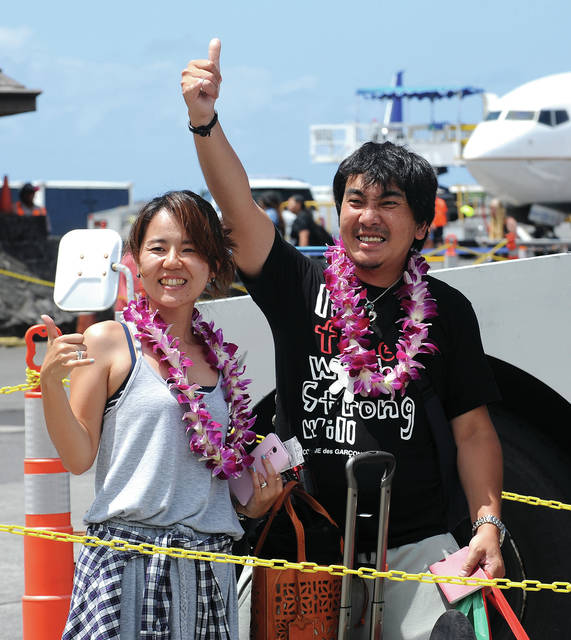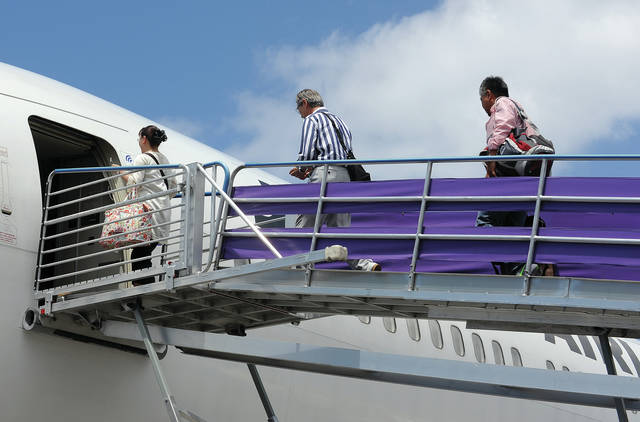KAILUA-KONA — The past year has been unlike any other in the history of Hawaii Island tourism.
The return of Japan Airlines direct service to Ellison Onizuka Kona International Airport at Keahole just more than 12 months ago marked the beginning of the roller coaster ride, bolstering unprecedented industry success on Hawaii Island in the fourth quarter of 2017 — a trend that more or less kept pace through the first quarter of 2018.
Then, Kilauea volcano erupted in lower Puna and the numbers came crashing down.
“It’s something we’ve never really seen in the history of tourism, where it goes from extreme high to extreme low in a really short period of time,” said Ross Birch, executive director of the Island of Hawaii Visitors Bureau. “Luckily, we were able to maintain some momentum through May and June, but then it really started to taper off quickly.”
The eruption, the following lava flow and subsequent destruction have subsided. But Hurricane Lane in August and Tropical Storm Olivia in September each did their part to keep at arm’s length an industry resurgence for which tourism officials and businesses have been waiting anxiously.
Visitor spending on Hawaii Island dropped more than 7 percent in July, while arrivals dipped almost 13 percent from 2017. The hotel occupancy rate declined nearly 5 percent that month and Kohala Coast resorts fell victim to a 7 percent drop in revenue per available room.
Officials attributed nearly all of that decline to safety concerns and poor air quality in the wake of the eruption in Puna.
Spending and arrival statistics are forthcoming for August, but the Hawaii Tourism Authority released hotel figures Monday, which indicated a steady decline.
Occupancy, revenue per available room and average daily rate — the average amount charged per hotel room per day — were either flat or falling on the island for the third consecutive month, according to HTA statistics.
Revenue per available room was down 10 percent around the island and occupancy dropped more than 6 percent as compared with the same months in 2017, year-over-year decreases that exceeded those recorded in July. Average daily rate also dropped by two points in August.
Kohala Coast resorts were in even worse shape, with an almost 15 percent dip in revenue per available room and saw their occupancy rates plummet 9.5 percent from last year.
HTA blamed the numbers for August on Kilauea and Lane, as occupancy actually decreased statewide. If the weather turns, however, Birch is optimistic moving forward, mostly because of the return of Japan Airlines direct flights.
“We’re hopefully anticipating that extreme high to come back again because we do have the air access in place that didn’t leave the market when everything dropped,” he said.
Birch couldn’t say whether the numbers started climbing this month, and September figures won’t be available until near the end of October. He added that September has historically been a hit-or-miss month for Hawaii Island, and considering Olivia, numbers might go either way.
“A good group base helps in September,” he said. “Timeshare does well. From and independent traveler standpoint, it’s typically a pretty soft season for us. It looks like from the Japan market that September was pretty (good).”
Japanese travel is crucial to the health of island tourism as it’s traditionally the second largest travel market to the island and the state outside of the mainland U.S.
Based on numbers from the HTA, year-over-year visitor arrivals from Japan jumped nearly 33 percent in 2017 with only a little more than three months of renewed direct flights. It decreased in every year except 2012 and 2016 since Japan Airlines stopped flying direct to Kona in 2010. And the 2016 bump in arrivals was only a meager 1.7 percent.
Visitor spending from Japan didn’t struggle as much during those off years, but dipped every year between 2013 and 2015. Spending bounced back slightly in 2016 and jumped nearly 8 percent in 2017, according to HTA. Presumably, a significant portion of that bounce back can be attributed to the return of Japan Airlines direct flights.
Representatives of Japan Airlines visited the Kona airport Sept. 15 to celebrate the one-year anniversary of the return of direct flights to Hawaii Island after a roughly seven-year hiatus.
Kiyoto Morioka, senior vice president of the Americas for Japan Airlines, explained the impact Hawaii’s tumultuous times had on incoming travel from the country.
“We have seen a decline in group travel from Japan since May, about a 10 percent decrease in the number of passengers” Morioka said. “However, we have been concurrently strengthening our sales activities in Japan to boost not only the Kona route, but all of our other Hawaii routes. We also plan to continue to promote our Hawaii routes as the volcanic activity declines.”
Lane and Olivia had limited impact on Japan Airlines operations, he said.
“We are now starting to resume our flight operations from Kansai Airport,” Morioka added.
Email Max Dible at mdible@westhawaiitoday.com.










